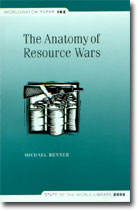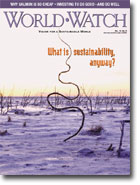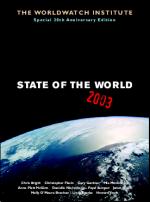
| Suchen | Themen | Lexikon |
| Register | Fächer | Datenbank |
| Medien | Links | Daten | |
| Projekte | Dokumente | ||
| Schule und Agenda 21 | |
| Lokale Agenda | Globale Agenda |

 |
|
|
|
 |
||||||||||||||||||
| Kontakt | Haftungsausschluss |
|
 |
|
|
|
|
|||||
| |
Englisch - Unterricht: Informationen,
Diskussionen, Materialien, Literatur Diese Liste dient zur Orientierung über neue Inhalte in englischer Sprache Sie ist daher nicht thematisch gegliedert. Thematisch sortierte Informationen erreichen Sie über die Themenübersicht oder Homepage |
 => Erneuerbare Energien |
Special Report: International Conference for Renewable Energies— Part 2: Conference Highlights & Results The Worldwatch delegation to International Conference for Renewable Energies — Renewables 2004 in Bonn, Germany, released the following press release earlier today at the close of the conference. Bonn Conference Ends With Strong Support for Renewable Energy The International Conference for Renewable Energies—Renewables 2004— concluded Friday with a strong declaration by 154 governments that renewable energy should and will play a major role in the energy economy of the 21st century. more.. |
www.worldwatch.org => Erneuerbare Energie |
Worldwatch has launched a new series of web pages devoted to the topic of renewable energy. Timed to coincide with the start of the International Conference for Renewable Energies in Bonn, Germany, the pages contain an overview of the conference, information about Worldwatch research on renewable energy, and related links. www.worldwatch.org/features/renewables/ |
 |
Free Download: The Anatomy of Resource Wars Many Worldwatch publications older than 18 months are available for free on our website as downloadable PDFs. The latest offering is: Worldwatch Paper #162: The Anatomy of Resource Wars In countries around the developing world, abundant natural resources help fuel conflict. Governments, rebels, and warlords have made billions of dollars by selling conflict commodities like diamonds, oil, timber, and coltan. As they use the money to arm themselves and line their own pockets, the cost of these conflicts has been extraordinary—more than 5 million people killed during the 1990's, as many as 20 million driven from their homes, and considerable environmental destruction. In this publication, senior researcher, Michael Renner assesses the anatomy of resource wars, examines a number of specific cases, and discusses efforts to break the link between resources and conflict. => Konflikte, Krieg und Frieden > Dokumente => Energie, Ressourcen > Dokumente |
| State
of the World 2004: The State of
Consumption Today From fast food to disposable cameras and from Mexico to South Africa, people are entering the consumer society at a mind-numbing pace. By one calculation, there are now more than 1.7 billion members of “the consumer class”—nearly half of them in the developing world. A lifestyle and culture that became common in Europe, North America, Japan, and a few other pockets of the world in the twentieth century is going global in the twenty-first. Yet the world is one of contrasts. While the consumer class thrives, great disparities remain. As many as 2.8 billion people on the planet struggle to survive on less than $2 a day, and more than one billion people lack reasonable access to safe drinking water. In the first chapter of State of the World 2004, Worldwatch researchers Gary Gardner, Erik Assadourian, and Radhika Sarin explore trends in the global consumption of resources, goods, and services and examine the massive disparities in consumption levels worldwide. Get the trends and facts online: www.worldwatch.org/topics/consumption/sow/trendsfacts/2004/02/04/ Visit our online portal for more on
consumption: |
|
 |
World Watch Magazine: September/October 2003 Sea-based farming has made salmon one of the cheapest and most plentiful protein products on the world market. But as prices drop, the real costs of this one-time delicacy are widespread environmental damage and threats to human health, reports John Ryan in the Sept./Oct. issue of World Watch magazine. Also in this issue is an interesting article on sustainability—the ability to meet our needs without compromising the ability of future generations to meet theirs. In it, Thomas Prugh and Erik Assadourian ask what it will really take for our species to not only survive but thrive over time. To view the complete Table of Contents for the September/October issue, click here. => Ernährung & Landwirtschaft; Gesundheit; Nachhaltigkeit |
Ölpest durch "Prestige" |
Englisch: Öltankerkatastrophe in den Medien Wie berichteten die britischen Medien über den Untergang der "Prestige"? Sek. II, Leistungskurs Englisch bzw. Biologie oder fächerverbindend Das Beispiel der Umweltkatastrophe, verursacht durch die Havarie des Öltankers "Prestiges" im November 2002 vor der Küste Galiziens, soll dazu anregen, aktuelle Themen im fremdsprachlichen Unterricht gemeinsam mit anderen Fächern zu behandeln und dabei das Internet Informationsquelle einzubeziehen. Weitere Infos, didaktisch/methodische Hinweise, Materialien [lehrer-online] => Extrasite: Umweltkatastrophe durch den Öltanker "Prestige" |
| Presseartikel UN-Sicherheitsrat Gewaltmonopol |
Richard Perle, einflussreicher Berater von US-Verteidigungsminister Donald Rumsfeld, widerspricht in seinem Kommentar im "Guardian"
der weit verbreiteten Auffassung, der Einsatz militärischer Gewalt könne nur durch den UN-Sicherheitsrat legitimiert werden. Richard Perle: Thank God for the death of the UN. Its abject failure gave us only anarchy. The world needs order. [Gurdian, Friday March 21, 2003] |
| Online discussion Friday, March 7, 2003 12PM -1PM EST (17:00 -18:00 GMT) www.worldwatch.org |
"Engaging Religion in the Quest for Sustainability" Historically, the divide between religion and science has led environmental and religious communities to be suspicious of each other. But as Gary Gardner notes in "Engaging Religion in the Quest for Sustainability", issues like deforestation, climate change and poverty are increasingly bringing these two groups closer. As spiritual traditions, from large, centralized religions to local tribal spiritual authorities, are beginning to devote energy to building just and environmentally healthy societies, secular advocates of sustainability are becoming somewhat more receptive to spiritual appeals. Gardner argues that this mutual openness could reintroduce a passionate voice to the environmental movement that would build a spiritual/ emotional connection between the public and the natural environment. |
| Online discussion Friday, February 28, 2003 12PM -1PM EST (17:00 -18:00 GMT) www.worldwatch.org |
 State
of the World 2003 - Uniting Divided Cities State
of the World 2003 - Uniting Divided CitiesJoin State of the World 2003 author Molly O'Meara Sheehan in a discussion about the future of the world's cities and the plight of the peoples living within. As mega-cities in the global south shoot up, as many as 1 billion people worldwide live in "informal" settlements, because they cannot afford "formal" dwellings. These "informal" settlements are often located on steep hillsides or floodplains, in garbage dumps, or downstream from industrial polluters, and their inhabitants live not only with the constant threat of possible eviction but are also vulnerable to natural disasters and disease from lack of water and toilets. In Uniting Divided Cities, Molly O'Meara Sheehan explores what governments and slum residents themselves can do to help citizens feel secure in their own homes, make a living, and improve their environment. |
| Studie / Statistiken: => Irak-Konflikt |
Michael Renner (Forscher am Worldwatch-Institute) hat eine faktenreiche Studie erstellt (englisch): "Blood
and Oil - Alternatives to War in Iraq" [Worldwatch] Die Studie enthält 2 Statistiken "Die 10 führenden Erdöl-Länder / Ölkonzerne" und Statistiken zu Waffenexporten in die Golfregion von 1985 bis 2001 |
 |
Kenneth M. Pollack: "The Threatening Storm. The Case for Invading Iraq", 494 Seiten, Random House, New York 2002, 25,64 € (englisch) Rezension von CHRISTIAN SEMLER: "Kenneth M. Pollack sah 1991 als einziger amerikanischer Nahostexperte die Kuwaitinvasion des Irak voraus. Jetzt will er einen Krieg gegen Saddams Regime, um das Land wie einst Deutschland nach 1945 zu demokratisieren. Obwohl er durchdacht argumentiert, übersieht er die wesentlichen Probleme." mehr .. [taz,25.2.03] Direktbestellung bei Amazon => Irak-Konflikt > Literatur |
 |
Andrew & Patrick Cockburn:(Journalisten, Nahostkenner) "Out of the Ashes. The Resurrection of Saddam Hussein",
Harper Perennial 1999, 18 € (englisch) UNO-Waffeninspektoren in den Neunzigerjahren; Politik der US-Regierung im vergangenen Jahrzehnt gegenüber dem Irak; Verhältnis zur irakischen Opposition. Analyse-Ergebnis der Autoren: der letzte Golfkrieg wurde geführt, um den Status quo zu bewahren. mehr... [taz, 25.2.03] Direktbestellung bei Amazon.de => Irak-Konflikt > Literatur |
| Arbeitsblatt für den Englischunterricht Für die Klassen 8 bis 10. Schroedel-Verlag => Irak-Konflikt |
"The Iraq conflict - Will it never end?" - ein Arbeitsblatt zu den Hintergründen des Irak-Konflikts für den Englischunterricht
Der Irak-Konflikt reicht bis zum Golf-Krieg Anfang der neunziger Jahre zurück und steht mittlerweile kurz vor einer kriegerischen Eskalation. Ausgehend von der aktuellen Situation beleuchtet das Arbeitsblatt die Hintergründe des Irak-Konflikts und thematisiert die Aufgabe der UN-Waffeninspektoren. Außerdem werden die Gründe der USA für einen Krieg kritisch hinterfragt. Dabei wird auch die Öl-Problematik berücksichtigt. Bezug: 1,20 Euro Weitere Informationen / Voransicht/ Bestellung [ Schroedel-Verlag ] |
| Arbeitsblatt für den Englischunterricht Jahrgänge 10 bis 13 [Schroedel-Verlag => Irak-Konflikt |
Irak-Konflikt: "Iraq - Will there be war? " Für die US-Regierung ist es nur eine Frage der Zeit, wann sie Diktator Saddam Hussein durch einen Krieg ablösen wird. Die europäischen Staaten sind in dieser Frage gespalten. Das Arbeitsblatt beleuchtet die Geschichte und die Hintergründe des Irak-Konflikts. Die Schülerinnen und Schüler untersuchen die Positionen von Bush und Blair und diskutieren die Bedeutung des Öls in diesem Konflikt. In einer Voransicht kann der Inhalt vorab angeschaut werden. Bezug: 1,20 Euro Weitere Informationen / Voransicht/ Bestellung [ Schroedel-Verlag ] |
| The Sunshine Project, News Release, 7 February 2003 => Irak-Konflikt |
US Plans for Use of Gas in Iraq (Austin and Hamburg, 7 February 2003) - Top US military planners are preparing for the US to use incapacitating biochemical weapons in an invasion of Iraq. Secretary of Defense Donald Rumsfeld and Gen. Richard Myers, Chairman of the Joint Chiefs of Staff, revealed the plans in February 5th testimony before the US House Armed Services Committee. This is the first official US acknowledgement that it may use (bio)chemical weapons in its crusade to rid other countries of such weapons. The Sunshine Project and other nonprofits have warned since late 2001 that the "War on Terrorism" may result in the United States using prohibited biological and chemical armaments, thereby violating the same treaties it purports to defend. The US announcement creates grave concerns for the future of arms control agreements, particularly the Chemical Weapons Convention more.. [sunshine-project] |
| George Walker Bush US-Präsident Rede vor Kongress => Irak-Konflikt |
"State of the Union" Am 29.01.03 erklärte US-Präsident George W. Bush in seiner Rede zur Lage der Nation, dass der Irak Massenvernichtungswaffen besitze und dass die USA notfalls auch ohne die Unterstützung anderer Staaten oder UN-Mandat in einen Krieg gegen den Irak ziehen werden. [ Zur Rede im Wortlaut (englisch) / Whitehouse.gov ] |
| Hans Blix Irak-Bericht => Irak-Konflikt |
Transcript of Blix's remarks |
|
Secretary Colin L. Powell |
"It was not soft power that freed Europe" "There is nothing in American experience or in American political life or in our culture that suggests we want to use hard power. But what we have found over the decades is that unless you do have hard power -- and here I think you're referring to military power -- then sometimes you are faced with situations that you can't deal with. I mean, it was not soft power that freed Europe. It was hard power. And what followed immediately after hard power? Did the United States ask for dominion over a single nation in Europe? No. Soft power came in the Marshall Plan. Soft power came with American GIs who put their weapons down once the war was over and helped all those nations rebuild. We did the same thing in Japan." [ Wortlaut der Rede / US-Government ] |
| ESPERE "Environmental Science Published for Everybody Round the Earth" www.espere.net europäisches Klimaprojekt an Schulen  |
"Ein Tag zum Klima"- Start eines europäischen Klimaprojektes für Schulen Das Thema Klima und seine Beeinflussung durch den Menschen ist von dauernder Aktualität, das Interesse der Menschen an möglichen Veränderungen groß. Diese Inhalte in der Schule zu vermitteln ist nicht einfach, weil sie zumindest die Fächer Geographie, Chemie und Physik übergreifen. Mit dem ESPERE-Projekt entsteht seit Anfang 2003 ein Netzwerk, in dem Wissenschaftler mit Lehrern und Schülern in vielen Staaten Europas gemeinsam die Klimaproblematik im Unterricht behandeln.... [ mehr.. bei: TeachersNews ] => Klima > Klimaschutzprojekte in Schulen Information on the climate system ... for schools and the world's citizens Our climate: Air, Ice, Water, Rocks, Soil, Life How are they interacting? In which way does man interfere? What scientists understood during the recent 30 years and what they are investigating today is going to be presented step by step on these pages - topical, multilingual, state of the art, comprehensible for everybody: www.espere.net |
Kampagne gegen Geländewagen www.thedetroitproject.com => Mobilität & Verkehr => Energie |
 The Detroit Project by
Americans for fuel efficient cars The Detroit Project by
Americans for fuel efficient carsDie USA haben einen neuen Feind im Innern entdeckt: den Geländewagen. Mit ihrem überdimensionalen Spritdurst verstärken die so genannten Sport Utility Vehicles (SUVs) die amerikanische Abhängigkeit von ausländischem Öl und helfen den gefürchteten Schurkenstaaten bei der Finanzierung des internationalen Terrorismus. Zu dieser Erkenntnis kam im Oktober 2002 die US-Journalistin Arianna Huffington in einer ihrer Kolumnen und gründete "The Detroit Project". Mit Werbespots ruft die Kalifornierin Industrie und Gesellschaft zum effizienteren Umgang mit Benzin auf - und spaltet damit die Nation Hintergrundbericht: "Neuer Feind der USA: Spritschlucker" [Volltext/ taz,4.2.03] Schon zuvor hatte das "Evangelical Environmental Network" die Kampagne "What would Jesus drive" für spriteffiziente Autos initiiert (im folgenden) |
 because transportation is a moral issue http://whatwouldjesusdrive.org => Mobilität & Verkehr => Energie |
|
 www.bwpp.org => Bio-Terrorismus => Irak-Konflikt |
Neue weltweite Initiative gegen biologische Waffen gegründet Ein knappes Dutzend internationaler Friedens- und Abrüstungsorganisationen haben am 11.11.02 in Genf ein neues weltweites Netzwerk aus der Taufe heben, das für mehr Offenheit und Transparenz im Bereich der biologischen Forschung sorgen möchte. Das BioWeapons Prevention Project (BWPP) wird Aktivitäten von Regierungen, Industrie und anderen unter die Lupe nehmen, um so das weltweite Verbot biologischer Waffen zu stärken. Das Augenmerk des BWPP liegt dabei unter anderem auf der Biowaffen-Abwehrforschung oder auf der formalen Einhaltung der Vorgaben der Biowaffen-Konvention, aber auch etwas allgemeiner auf biologischen Forschungen und Fähigkeiten in verschiedenen Ländern. |
| Online Discussion Friday, February 7, 2003 12PM -1PM EST (17:00 -18:00 GMT) |
Online Discussion: State of the World 2003 -- Combating Malaria Join State of the World 2003 author Anne Platt McGinn in a discussion about the global comeback of one of humanity's oldest scourges In Combating Malaria, Anne Platt McGinn discusses what it will take to protect more people from Malaria. Rivaling AIDS, Malaria kills up to 7,000 people a day, primarily children in sub-Saharan Africa. Malaria has become resistant to most anti-malarial drugs, making treatment vastly more complicated and expensive. Poverty, war, and civil strife make it hard for governments to implement preventive and curative measures. At the same time, people are not making use of safe, effective, and affordable ways to control the mosquitoes that carry the disease. Join State of the World 2003 authors every Friday through March 14 for live web chats covering individual chapters. Go to www.worldwatch.org/live/ for more information. |
 |
State of the World 2003 "The most comprehensive, up-to-date, and accessible summaries...on the global environment." E. O. Wilson, Pulitzer Prize winner If we are going to reverse biodiversity loss, dampen the effects of global warming, and eliminate the scourge of persistent poverty, we need to reinvent ourselves—as individuals, as societies, as corporations, and as governments. In this 20th anniversary edition of a Worldwatch classic, the Institute’s highly respected interdisciplinary research team argues that past successes—such as the elimination of smallpox and the encouraging drop in birth rates in many countries — prove that humanity is capable of redirecting itself in positive ways. For more information, or to order a copy of , go to: www.worldwatch.org/pubs/sow/2003/ |
|
|
|
|
||
| Stand:05.06.04/zgh | ||
|
|
||||||||||||||||||||||
|
|
|
|
|||||||||||||||||||
|
|
||||||||||||||||||||||
| Kontakt | über uns | Impressum | Haftungsausschluss | Copyright © 1999 - 2025 Agenda 21 Treffpunkt | |||